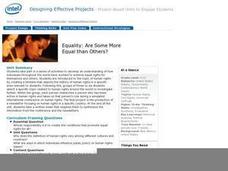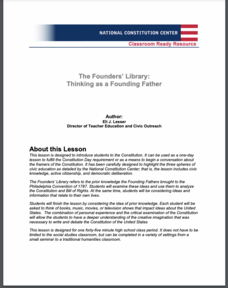Curated OER
Don't Just Dream-Act
Students create campaign materials to encourage the passage of legislation supporting higher education for immigrant minors. They produce flyers, brochures, pins and a voter presentation for a school fair. To prepare the materials they...
Curated OER
Hitler's Fatal Gamble
Students consider the differences between totalitarianism and democracy. In this comparative politics lesson, students will read a handout describing the major components that comprise totalitarianism and democracy, then they will...
Curated OER
"I Have a Dream" Shown in Pictures
Students demonstrate their understanding of Dr. King's dreams by drawing a picture representing one of them. In this Dr. King activity lesson, students read the speech "I Have a Dream" and discuss the vocabulary. Students select one of...
Curated OER
Equality: Are Some More Equal than Others?
Young scholars research a person who has been active in supporting human rights around the world. They simulate an international conference and write a newsletter focused on human rights in a specific country.
Curated OER
Antisemitism in Early America
Eleventh graders explore the rise of antisemitism in the United States in the early 20th century. After reading a passage concerning one man's ordeal, 11th graders discuss how the civil rights of minority groups has been viewed in...
School Improvement in Maryland
Supreme Court Case Overview I
As part of a study of the 14th Amendment to the United States Constitution, class members examine four Supreme Court decisions—Gitlow v. New York, Mapp v. Ohio, Gideon v. Wainwright, and Griswold v. Connecticut—that incorporated the due...
Center for Civic Education
Orb and Effy Learn About Authority
Simplify the teaching of the US Constitution with this primary grade social studies lesson. While reading a fun story about an imaginary place called Bubble Land, children learn about the concept of authority and the importance of rules...
Center for Civic Education
What Is Authority?
Young scholars examine the concepts of power and authority as they begin learning about government in this elementary social studies lesson. Through a series of readings, discussions, and problem solving activities, children learn about...
Center for Civic Education
What Basic Ideas About Government Are Included in the Preamble to the Constitution?
Young historians explore the meaning of the Preamble to the US Constitution in this upper-elementary social studies lesson. Working with partners or in small groups, children discuss the purpose of government before reading and analyzing...
Curated OER
What is the Federal System Created by the Constitution?
Explore the unique structure of the federal system of government in the United States. Class members will learn about how most nations were organized before the establishment of the Constitution, how power is currently divided between...
Center for Civic Education
What Does Returning to Fundamental Principles Mean?
Looking for materials for your Constitution Day and Citizenship Day lessons? Then check out this packet of activities that not only gets your class members thinking critically about the fundamental principles at the heart of American...
Curated OER
What is Meant by Returning to Fundamental Principles?
What did the Founding Fathers mean by the importance of continually returning to fundamental principles? Your young historians will analyze a series of quotations illustrating the fundamental ideals and principles of the United States...
Curated OER
Contextualizing a Historical Photograph: Busing and the Anti-busing Movement in Boston
Pupils explore the civil rights movement. They identify the causes and consequences of the anti-busing movement in Boston. Students construct a narrative to explain the context of an historical photograph related to the anti-busing...
Curated OER
Class Rules Contract
First and second graders construct a contract for classroom rules. They define a contract and then choose rules for classroom behavior. Each learner writes these rules down on a class rules contract worksheet (included).
Curated OER
Learning from the Past: A New Approach
Young scholars research nonprofit organizations. As they research, they learn how those living in the colonial period formed community organizations to provide for the common good of their society. Each pupil chooses one organization to...
Center for Civic Education
Matching Game with the US Constitution
In September we celebrate Constitution Day. Begin the celebration with a grand conversation about the US Constitution. Follow up the in-depth discussion with a learning game in which scholars match terms to images such as the...
Curated OER
How was the Constitution Used to Organize the New Government?
How did the United States Congress determine how the new president and vice president would be named when the nation was first established? Who would provide money for the government, and how would the executive branch be organized?
Curated OER
Have Minorities Gained Acceptance
Students cite evidence gathered from magazines about how much Blacks are accepted into the mainstream of American life. They support their conclusions by writing an answer to an essay question.
Curated OER
When Property Rights and the Public Good Clash
Students analyze a case involving a government's use of eminent
domain powers to construct a comprehension of property rights and how they might be viewed as essential protections for citizens in a constitutional democracy. They Use the...
North Carolina Consortium for Middle East Studies
Missing Pieces of the Puzzle: African Americans in Revolutionary Times
What's missing from most studies of the American Revolutionary War is information about the role African Americans played in the conflict. To correct this oversight, middle schoolers research groups like the Black Loyalists and Black...
Curated OER
The Founders’ Library: Thinking as a Founding Father
Students analyze the U.S. Constitution and the Bill of Rights. In this U.S. government lesson, students examine books, movies, and music that influence them today and then investigate writings that influenced the framers of the...
Curated OER
Roots of Religious Liberty
Students examine the First Amendment and consider the contributions of James Madison and Thomas Jefferson. They review conflicts between the rights of Church and State and write a Madisonian argument on the issue.
Curated OER
A Right to Bear Arms - One Patriot's View
Students research Samuel Adams' role in the crafting of the Second Amendment. They consider how Adams' views evolved with time and write a one-page response linking their research to current events.
Curated OER
Church and State Separation: The Challenge and the Debate
Students describe the basic elements of the U.S. Constitution's First Amendment as it relates to the separation of church and state and freedom of religion.

























